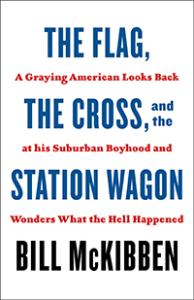
Bill McKibben is the author of more than a dozen books, including the best sellers Falter, Deep Economy, and The End of Nature, which was the first book to warn the general public about the climate crisis. He is the Schumann Distinguished Scholar in Environmental Studies at Middlebury College and the winner of the Gandhi Prize, the Thomas Merton Prize, and the Right Livelihood Prize, sometimes called “the alternate Nobel.” He lives in Vermont with his wife, the writer Sue Halpern. He founded the global grassroots climate campaign 350.org; his new project, organizing people over sixty for progressive change, is called Third Act.Bill McKibben is the author of more than a dozen books, including the best sellers Falter, Deep Economy, and The End of Nature, which was the first book to warn the general public about the climate crisis. He is the Schumann Distinguished Scholar in Environmental Studies at Middlebury College and the winner of the Gandhi Prize, the Thomas Merton Prize, and the Right Livelihood Prize, sometimes called “the alternate Nobel.” He lives in Vermont with his wife, the writer Sue Halpern. He founded the global grassroots climate campaign 350.org; his new project, organizing people over sixty for progressive change, is called Third Act.
Books

About THE FLAG, THE CROSS, AND THE STATION WAGON
A Graying American Looks Back at His Suburban Boyhood and Wonders What the Hell Happened
Bill McKibben—award-winning author, activist, educator—is fiercely curious.
“I’m curious about what went so suddenly sour with American patriotism, American faith, and American prosperity.”
Like so many of us, McKibben grew up believing—knowing—that the United States was the greatest country on earth. As a teenager, he cheerfully led American Revolution tours in Lexington, Massachusetts. He sang “Kumbaya” at church. And with the remarkable rise of suburbia, he assumed that all Americans would share in the wealth.
But fifty years later, he finds himself in an increasingly doubtful nation strained by bleak racial and economic inequality, on a planet whose future is in peril.
And he is curious: What the hell happened?
In this revelatory cri de coeur, McKibben digs deep into our history (and his own well-meaning but not all-seeing past) and into the latest scholarship on race and inequality in America, on the rise of the religious right, and on our environmental crisis to explain how we got to this point. He finds that he is not without hope. And he wonders if any of that trinity of his youth—the flag, the cross, the station wagon—could, or should, be reclaimed in the fight for a fairer future.
